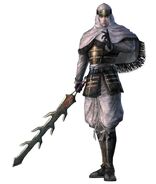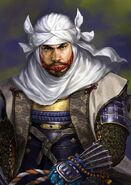| Kenshin Uesugi | |
|---|---|
 | |
|
Games |
Samurai Warriors |
|
Clan |
Uesugi |
|
Weapon |
sword |
|
Battles |
Kawanakajima |
Kenshin Ueasugi 1st appeared. He is normally seen controlling his own.
Games[]
Samurai Warriors[]
In the series, Kenshin leads the Uesugi forces to battle in sacred bouts with his nemesis, Shingen. They often clash strategies with neither truly stumping the other. When he's not fighting Shingen, Kenshin is often seen disrupting Nobunaga's troops. He acts as a mentor for his adoptive son, Kagekatsu Uesugi, and Kanetsugu Naoe. In the 1st game he fights Shingen in Kawanakajima.In his next stage Kenshin infiltrates Odawara castle where he meets with 2 other Takeda retainers Yukimura Sanada and Kunoichi. He finaly fights Ujimasa Hojo when beting him he betrays Shingen's allince. then he attacks Ueda castle fighting Masayuki Sanada and Shingen in the middle of the battle. After this stage he faces Nobunaga at Gifu Castle. If you beat Nobunaga quicley Kenshin will face Shingen again at Kawanakijima but if you face to beat Nobunaga quicley Kenshin will face Shingen at Anegawa. In the Samurai Warriors 2, Kenshin saves his rival from the jaws of defeat at Nagashino and defeats Nobunaga. As with his upper path ending in the previous title, he spares his rival's life and names him a friend. His dream stage has them work together to conquer the rest of Japan. The last piece of their journey is Kyushu, where they face the Shimazu clan.
Kessen[]
In Warriors Orochi, Kenshin allies himself with Shingen to serve as a powerful resistance group against Orochi. After testing Nobunaga's worth, they assist him during his assault on Da Ji.
Devil Kings[]
Kenshin's name in this game is Frost. Has a romantic relationship with Venus. He weilds a Sword in battle.
Charecter Information[]
Voice Actors[]
- Beau Billingslea - Samurai Warriors, Kessen III (English)
- George Cook - Samurai Warriors 2 (English)
- Philip Hersh - Warriors Orochi series (English)
- Jōji Nakata - Samurai Warriors and Warriors Orochi series (Japanese)
- Akio Ohtsuka - Kessen III (Japanese)
- Mugihito - Nobunaga's Ambition Online (Japanese)
Quotes[]
Samurai Warriors[]
- "A warrior lives for battle."
- "May the gods show you mercy!"
- "Battle is ecstasy."
- "Flames of hell... Vanquished the wicked!"
- "I shall you teach the true horrors of war."
- "Nobunaga! The great Tedorigawa will wash your ambitions away for good!"
- "War is like a fine wine... Come, let us savor its taste."
- "Great Bishamonten, God of War, show me the correct path. Lead us to victory."
- "Great Bishamonten, God of War, lend me the power to strike down my foes!"
- "Over already? I was hoping for more of a challenge!"
Army[]
- Kanetsugu Naoe
- Keiji Maeda
- Kagekatsu Uesugi
- Sadimitsu Usami
- Kageie Kakikazaki
- Kagetsuna Naoe
- Kagemochi Amakasu
- Tomonobu Saito
- Shigenaga Honjo
- Nobutsuna Kamiizumi
- Yoshitomo Yasuda (See Also: Uesugi clan)
Weapons[]
Samurai Warriors 2[]
 |
Kenshin's weapon's in SW2 |
History[]
Uesugi Kenshin was and still is considered a man of integrity and mystery. He had several rivals on his rise to power, but he was personally not interested in ruling other lands or politics. Leaving the politics of the land to his retainers, Kenshin was more interested in sharpening his swords in preparation for the next conflict. Believing that he was the embodiment of his revered deity, Bishamonten, he was eager to fight in "beautiful combat" (some stories even state that he believed he was the reincarnation of his god). Unlike most other daimyo in his time, he was often seen in a monk's attire and is famous for wearing his white clothed hood. Even if he was dedicated to his faith, he was also known as a delicate and caring lord who would shed tears for the lives lost in his campaigns. His declarations for fighting in the name of justice and his wise strategies earned him the admiration of his vassals. Even now, there are still people in Yonezawa who argue that Kenshin was the strongest general during the Warring States era.
Kenshin is well known for his rivalry with Takeda Shingen. Both men held a similar reputation but were radically different from one another. Although it is often romanticized that both rivals respected one another greatly, it is more likely that Kenshin disliked Shingen. Shingen's flamboyant lifestyle was a sharp contrast to Kenshin's reserved mindset and it was said that Kenshin was always angered when he rode into battle against Shingen. Over time, however, his feelings towards his rival seemed to have changed. While he was dining, Kenshin heard the news of his rival's death from his vassals in 1573. He replied, "I have truly lost an excellent match before my time. There are no others in the world who can return him, be they man or child." He then dropped to the floor and wept bitterly. His vassals urged their lord to attack the crippled Takeda but Kenshin answered, "Even if I were to win with the tainted air of victory, it would be immature."
One of the most famous incidents between Kenshin and Shingen was when a number of other daimyo (including the Hojo clan) boycotted salt supplies to Kai province. Kenshin heard of Shingen's problem with a daimyo of the Hōjō clan who refused to send rice to him. Kenshin secretly sent salt to the Takeda (salt was a precious commodity as it was used in preserving food) and wrote to his enemy that in his opinion, the Hōjō lord had committed a hostile act. Although he could have cut off Shingen's supplies and "lifeline", Kenshin decided not to do so because it would be dishonorable. In reflection, Kenshin made a statement "Wars are to be won with swords and spears, not with rice and salt." In this, Kenshin set a noble example for all time in his treatment of his rival Shingen. The statement is a common modern reference by peace advocates who in recognition of Kenshin state that "peace is to be achieved with rice and salt, not with swords and spears". As thanks, Shingen gave away a precious sword (tachi) which was forged by the revered swords smith, Fukuoka Ichimonji, to Kenshin. The sword is kept today at the Tokyo National Museum and is considered an Important Cultural Property.
His hobbies include collecting fine swords, waka poetry, singing and playing the lute. His height in modern conversions is approximately 156~157 cm (roughly between 5'1" and 5'2") and his blood type was AB. A devout monk, he had no known wives or concubines yet his celibate nature has been a subject of debate for centuries. This maybe due to his conscious recognition of love and courting in poems and stories. He had no biological children but he did adopt six children: four sons, one daughter and one that was still born from the Oda family.


